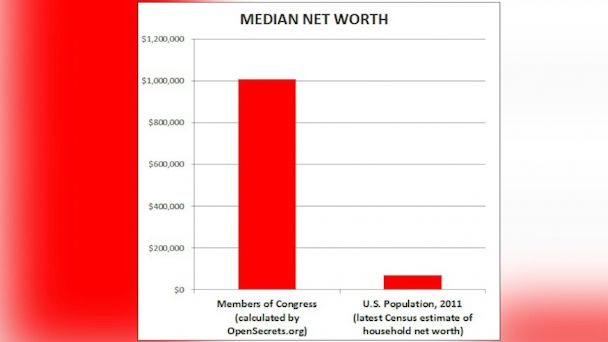This Chart Explains Why Politicians Aren't Like The Rest of Us

Image credit: ABC News
Members of Congress have always been rich, and today they're even richer.
In fact, a new study from the Center for Responsive Politics suggests, it's possible more than half of them are millionaires.
Under the Ethics in Government Act of 1978, lawmakers are required to submit personal financial-disclosure forms to their respective chambers, listing their assets and liabilities, like ownership in companies, investments in mutual funds, property, stocks, etc. Lawmakers mark these assets and liabilities under ranges of value, for instance $1,001 to $15,000, $15,001 to $50,000, $50,001 to $100,000, $100,001 to $250,000, $250,001 to $500,000, $500,001 to $1 million, and over $1 million.
The Center for Responsive Politics, which runs the money-in-government website OpenSecrets.org, calculated the maximum and minimum possible net worth of each member of Congress, by adding up the high and low ends of the value ranges for each asset and liability listed. They then averaged the two and found that, for more than half of members, that average is over $1 million.
The group wrote, in a recent blog post, that of the 533 members of Congress:
… at least 268 had an average net worth of $1 million or more in 2012, according to disclosures filed last year by all members of Congress and candidates. The median net worth for the 530 current lawmakers who were in Congress as of the May filing deadline was $1,008,767 - an increase from last year when it was $966,000. In addition, at least one of the members elected since then, Rep. Katherine Clark (D-Mass.), is a millionaire, according to forms she filed as a candidate. (There is currently one vacancy in Congress.)
Last year only 257 members, or about 48 percent of lawmakers, had a median net worth of at least $1 million.
As he has before, House Oversight and Government Affairs Committee Chairman Darrell Issa, R-Calif., topped the list with an estimated (or averaged) net worth of $464 million.
Members' wealth comes into this particular focus as rich vs. poor has become a recent theme in American politics.
The 50th anniversary of Lyndon Johnson's War on Poverty has stirred some debate about income inequality, a new political and policy focus for the White House. Sen. Chuck Schumer, D-N.Y., on Sunday suggested Congress could take up a minimum-wage hike in the next months.
The Senate this week debated whether (and how) to renew extended unemployment benefits for 1.4 million Americans. Most states offer 26 weeks of unemployment benefits for those unemployed through no fault of their own (i.e., they didn't quit and weren't fired for cause) and are actively seeking work. Under a federal program instituted during George W. Bush's presidency, federal funds extend eligibility from 26 weeks to a total of 40 weeks to 73 weeks, in most states. That program expired in late December, and Republicans and Democrats have since negotiated over whether and how to offset the spending with other cuts.
In contrast to lawmakers' $1,008,767 median "average" net worth calculated by the Center for Responsive Politics, median household net worth in the U.S. was $68,828 in 2011, the most recent year for which the U.S. Census Bureau has estimated household net worth.